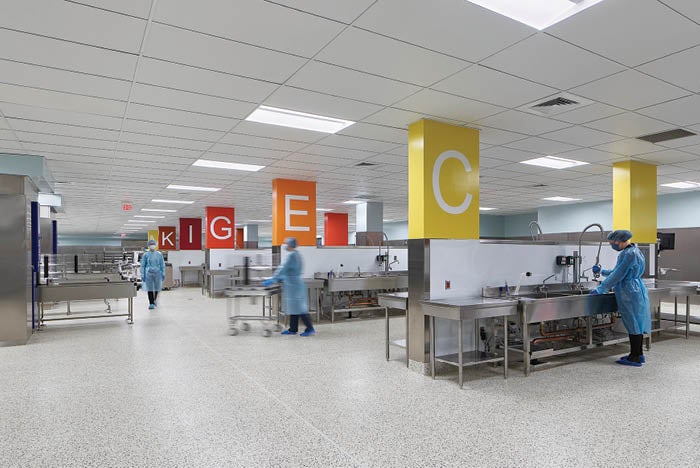Penn Medicine takes processing off-site

The ISC was designed with a forward-flow approach to eliminate cross-contamination between clean and dirty instruments.
Image courtesy of Penn Medicine
Penn Medicine’s instrument processing operations got a boost in efficiency with the opening of its 110,000-square-foot interventional support center (ISC).
The Philadelphia-based ISC is designed to process instruments from up to 200 surgical cases each day. In this space, staff will both sterilize and package thousands of instruments every day in preparation for surgeries and procedures — from basic scissors and clamps to advanced robotic instruments.
Penn purchased the entire building in 2018 and built a physical plant to combine instrument processing services from the Hospital of the University of Pennsylvania (HUP) and Pennsylvania Hospital, as well as three outpatient facilities: the Perelman Center for Advanced Medicine, Penn Medicine Radnor and the Tuttleman Center. A new construction dubbed HUP East will also be supported by the ISC when it opens this fall.
“By moving our processing operations from the traditional hospital setting to an off-site, dedicated facility, we’re able to increase efficiency in a high-quality, cost-effective way,” says Chris Pastore, ISC managing director. “Plus, the ISC alleviates space at our clinical locations, providing the breathing room hospital departments need to expand services. For example, thanks to the ISC’s capacity, Penn Medicine has been able to dedicate more space to patients at the new HUP East hospital opening later this year.”
Consolidating these services off-site helps to minimize any redundant equipment across the health system. Also, it is designed with a one-way, forward-flow approach that enables efficient instrument processing. The facility includes features that enhance sterilization efficiency, such as clean steam using reverse osmosis water.
The ISC will be a nearly dust-free facility thanks to increased air changes and filtration. Airlocks throughout the building also prevent cross-contamination of air between areas where dirty instruments are processed and clean ones are repackaged.
“Clean instruments are a crucial component of patient safety,” says Phil Okala, chief operating officer at the University of Pennsylvania Health System.
“Through centralized processing with state-of-the-art equipment, the ISC is an important element behind Penn Medicine’s efforts to continue delivering high-quality, advanced patient care and safety.”




